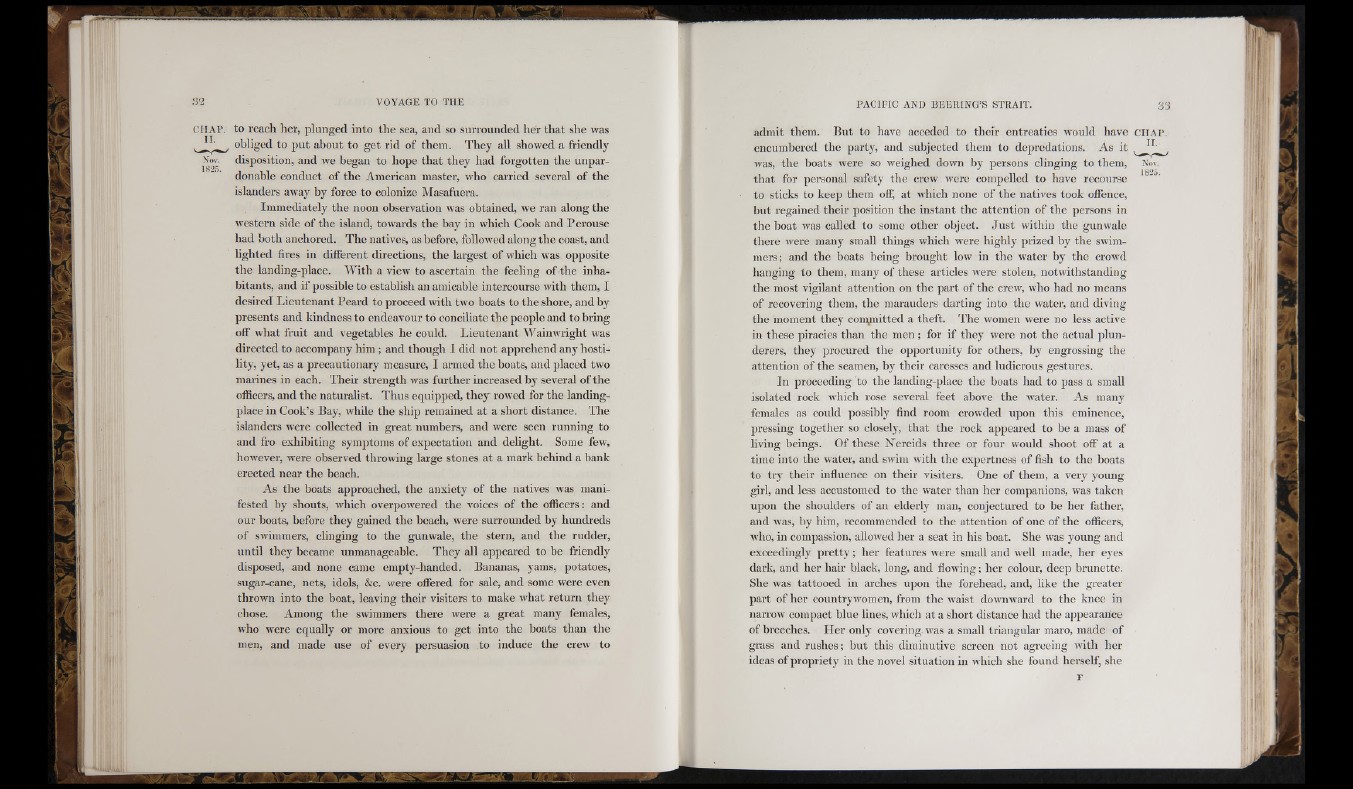
C H A P . to reach her, plunged into the sea, and so surrounded her that she was
Nov.
1S25.
obliged to put about to get rid of them. They all showed a friendly
disposition, and we began to hope that they had forgotten the unpardonable
conduct of the American master, who carried several of the
islanders away by force to colonize Masafuera.
Immediately the noon observation was obtained, we ran along the
western side of the island, towards the bay in which Cook and Perouse
had both anchored. The natives, as before, followed along the coast, and
lighted fires in different directions, the largest of wliich was opposite
the landing-place. YTth a view to ascertain the feeling of the inhabitants,
and if possible to establish an amicable intercourse with them, I
desired Lieutenant Peard to proceed with two boats to the shore, and by-
presents and kindness to endeavour to conciliate the people and to bring
off what fruit and vegetables he could. Lieutenant YY^ainwright was
directed to accompany him; and though I did not apprehend any hostility,
yet, as a precautionary measure, I armed the boats, and placed two
marines in each. Their strength was further increased by several of the
officers, and the naturalist. Thus equipped, they rowed for the landing-
place in Cook’s Bay, while the ship remained at a short distance. The
islanders were collected in great numbers, and were seen running to
and fro exhibiting symptoms of expectation and delight. Some few,
however, were observed throwing large stones at a mark behind a bank
erected near the beach.
As the boats approached, the anxiety of the natives was manifested
by shouts, which overpowered the voices of the officers; and
our boats, before they gained the beach, were surrounded by hundreds
of swimmers, clinging to the gunwale, the stern, and the rudder,
until they became unmanageable. They all appeared to be friendly
disposed, and none came empty-handed. Bananas, yams, potatoes,
sugar-cane, nets, idols, &c. were offered for sale, and some were even
thrown into the boat, leaving their visiters to make what return they
chose. Among the swimmers there were a great many females,
who were equally or more anxious to get into the boats than the
men, and made use of every persuasion to induce the crew to
admit them. But to have acceded to their entreaties would have c h a p .
encumbered the party, and subjected them to depredations. As it
was, the boats were so weighed down by persons clinging to them, Nov.
that for personal safety the crew were compelled to have recourse
to sticks to keep them off, at which none of the natives took offence,
but regained their position the instant the attention of the persons in
the boat was called to some other object. Just within the gunwale
there were many small things which were highly prized by the swimmers;
and the boats being brought low in the water by the crowd
hanging to them, many of these articles were stolen, notwithstanding
the most vigilant attention on the part of the crew, who had no means
of recovering them, the marauders darting into the water, and diving
the moment they committed a theft. The women were no less active
in these piracies than the men ; for if they were not the actual plunderers,
they procured the opportunity for others, by engrossing the
attention of the seamen, by their caresses and ludicrous gestures.
In proceeding to the landing-place the boats had to pass a small
isolated rock which rose several feet above the water. As many
females as could possibly find room crowded upon this eminence,
pressing together so closely, that the rock appeared to be a mass of
living beings. Of these Nereids three or four would shoot off at a
time into the water, and swim with the expertness of fish to the boats
to try their influence on their visiters. One of them, a very young
girl, and less accustomed to the water than her companions, was taken
upon the shoulders of an elderly man, conjectured to be her father,
and was, by him, recommended to the attention of one of the officers,
who, in compassion, allowed lier a seat in his boat. She was young and
exceedingly pretty ; her features were small and well made, her eyes
dark, and her hair black, long, and flowing; her colour, deep brunette.
She was tattooed in arches upon the forehead, and, like the greater
part of her countrywomen, from the waist downward to the knee in
narrow compact blue lines, which at a short distance had the appearance
of breeches. Her only covering was a small triangular maro, made of
grass and rushes; but this diminutive screen not agreeing with her
ideas of propriety in the novel situation in which she found herself, she
F
IT]